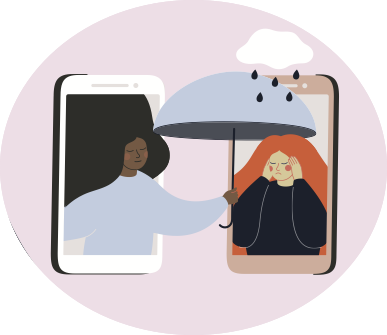Study: Later School Start Time Gave Small Boost to Grades But Big Boost to Sleep
 The physical and mental health benefits of getting a good night’s sleep are indisputable. What’s less clear is whether starting school later in the morning will prompt kids to sleep more and consequently learn more during the school day. Read more ›
The physical and mental health benefits of getting a good night’s sleep are indisputable. What’s less clear is whether starting school later in the morning will prompt kids to sleep more and consequently learn more during the school day. Read more ›


 Parenting a teen can be challenging, especially in a pandemic. Our teens are struggling right now for many reasons, and parents are grappling with how to support them in a meaningful way. How can you be a sounding board for your teen and really connect with them without trying to fix the problem or seem dismissive?
Parenting a teen can be challenging, especially in a pandemic. Our teens are struggling right now for many reasons, and parents are grappling with how to support them in a meaningful way. How can you be a sounding board for your teen and really connect with them without trying to fix the problem or seem dismissive?
 Being a parent is hard. Being a parent to a teenager is even harder. A young adult shares how parents can connect better with their teenagers who seek a balance between disciplinarian and friend.
Being a parent is hard. Being a parent to a teenager is even harder. A young adult shares how parents can connect better with their teenagers who seek a balance between disciplinarian and friend. 
 While active listening can be a difficult skill to learn in any relationship, it’s particularly challenging when one party is meant to occupy the role of authority figure. Parents need to realize that engaging in active listening does not mean never giving teens much-needed advice or discipline — it simply means ensuring that the teen feels heard and understood during the process.
While active listening can be a difficult skill to learn in any relationship, it’s particularly challenging when one party is meant to occupy the role of authority figure. Parents need to realize that engaging in active listening does not mean never giving teens much-needed advice or discipline — it simply means ensuring that the teen feels heard and understood during the process. 
 Having a healthy and trusting parent-child relationship during the teenage years is more important than ever. Staying close isn’t easy, though. Here are some tips for navigating the new terrain.
Having a healthy and trusting parent-child relationship during the teenage years is more important than ever. Staying close isn’t easy, though. Here are some tips for navigating the new terrain. 
 Who are you going to be with? Where are you going? When will you be home? The who, what, where, when, and whys we asked were the hallmarks of caring, active, involved parents. But the strategy didn’t work as well as hoped.
Who are you going to be with? Where are you going? When will you be home? The who, what, where, when, and whys we asked were the hallmarks of caring, active, involved parents. But the strategy didn’t work as well as hoped.


 Feeling anxious about coming out from behind your computer screen? You are not alone. According to the APA, nearly 50% of Americans say they feel anxious about getting back to ‘normal’ post-pandemic, enough for psychologists to coin the phrase “re-entry anxiety.”
Feeling anxious about coming out from behind your computer screen? You are not alone. According to the APA, nearly 50% of Americans say they feel anxious about getting back to ‘normal’ post-pandemic, enough for psychologists to coin the phrase “re-entry anxiety.”
 Parenting can be stressful under the best of circumstances, but moms and dads of children with developmental and mental health challenges often have to deal with strain of a different magnitude. Caring for a child with special needs can become a full-time job — and an overwhelming one at that, if you don’t have adequate support. Without enough help, parents may be headed toward caregiver burnout, which negatively affects everyone.
Parenting can be stressful under the best of circumstances, but moms and dads of children with developmental and mental health challenges often have to deal with strain of a different magnitude. Caring for a child with special needs can become a full-time job — and an overwhelming one at that, if you don’t have adequate support. Without enough help, parents may be headed toward caregiver burnout, which negatively affects everyone. 
 Between kindergarten and twelfth grade, students are expected to learn how to study, schedule their time and complete sizable assignments without procrastinating. Yet these skills often aren’t taught explicitly. With the increased self-sufficiency necessitated by virtual education, educators and parents can help students learn and manage their goals more effectively by directly teaching study skills.
Between kindergarten and twelfth grade, students are expected to learn how to study, schedule their time and complete sizable assignments without procrastinating. Yet these skills often aren’t taught explicitly. With the increased self-sufficiency necessitated by virtual education, educators and parents can help students learn and manage their goals more effectively by directly teaching study skills. 

